Chap Goh Meh – The Night of Romance

A fascinating Chap Goh Meh story tells the tale of a lonely young bachelor, who during an outing on this moonlit night, was suddenly enchanted when he caught a glimpse of the most beautiful girl he had ever seen. Intrigued by this exquisitely delicate beauty in all her finery, he wondered about her identity. With excitement pounding in his heart, the hopeful young man swiftly jotted down her car's number. The following morning, driven by enthusiasm, he sought her address and eagerly asked his mother to send a matchmaker to the home of the girl he envisioned marrying.
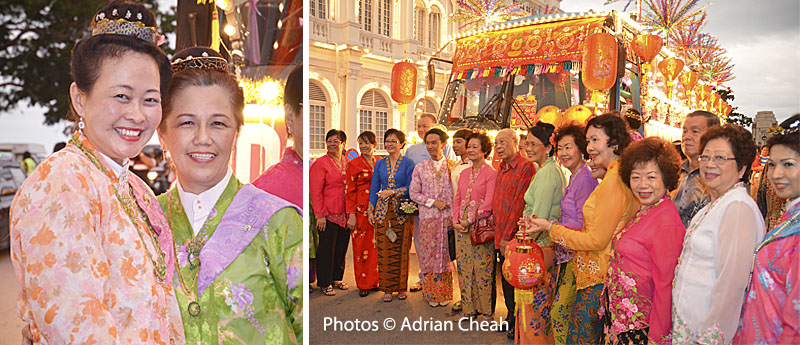
The matchmaker successfully carried out her duties, leaving the young man thrilled. However, he realised too late that the girl he loved was a visiting niece, not the house owner's daughter. On his wedding day, the dumbfounded groom discovered he had married her plain-looking cousin. Despite this twist, the story had a happy ending as his wealthy wife ensured a comfortable and fulfilled life.
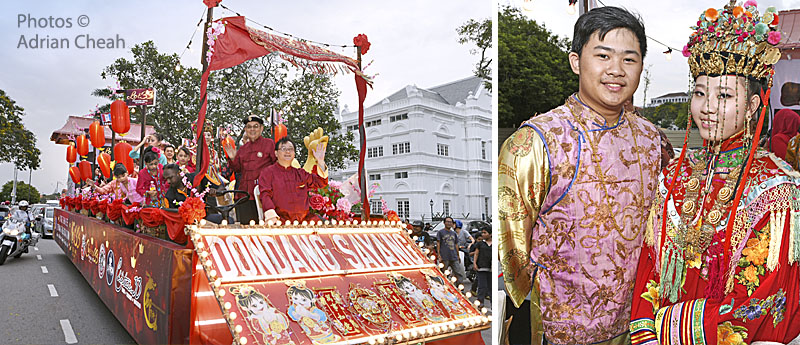
Chap Goh Meh – "the fifteenth night" in Hokkien, is a celebration to mark the end of the 15-day festivities of the Chinese New Year. During this auspicious occasion, Chinese homes are brightly decorated with lights, and lanterns are hung over balconies or main entrances. Prayers are offered to departed family members and ancestors.
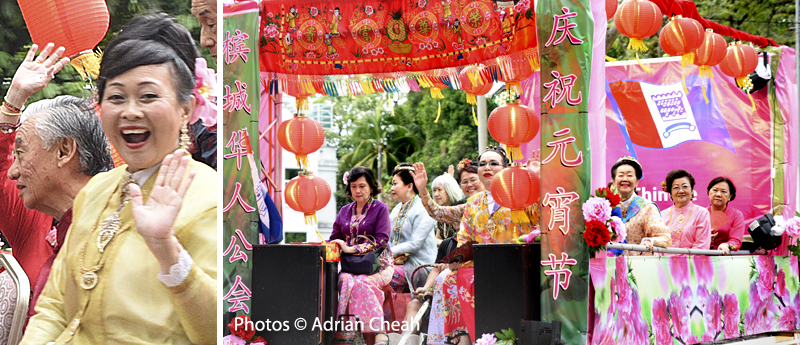

On this day, the Nyonyas prepare a sweet dessert known as pengat. The dish comprises sweet potatoes in three colours – yellow, orange and purple – along with taro, tapioca flour jelly, sago and caramelised bananas (almost invariably, pisang raja). These ingredients are served with a creamy coconut gravy infused with the fragrance of pandan (screw pine) leaves. Some may choose to incorporate black-eyed peas into the mix.

Bubur cha cha, on the other hand, has similar ingredients as pengat sans the bananas. If you ask different people, you will likely receive diverse interpretations of pengat and bubur cha cha. In some recipes, black-eyed peas are only used in pengat. Some would even add ti kuih (caramelised glutinous rice cake) to pengat. This however is never the case in my household.
In my view, the components of a dish should blend harmoniously, delivering well-balanced flavours and engaging textures. It is imperative to break free from rigid adherence to traditionalists' doctrines and not be shackled by their beliefs regarding mandatory ingredients and symbolic meanings. Consequently, I advocate for a more liberating approach – let your preferences dictate and embrace the spirit of experimentation. Being adventurous might unveil delightful surprises and uncharted culinary territories. This is something the Nyonyas have always prided themselves on – their ingenuity and willingness to experiment with flavours – leading to their culinary prowess.
In Malay, "bubur" translates to "porridge." The term "cha cha," homophonous with the Hokkien "che che" (signifying "abundance"), imbues the dish with a connotation of unity and abundant happiness.

This would also be the last day to toss yee sang among family and friends. The "prosperity toss" usually consists of a mixture of finely shredded vegetables topped with strips of raw fish and a variety of sauces and condiments. Using chopsticks, diners collectively toss the shredded ingredients into the air while ushering in various "auspicious wishes" aloud. Beyond being a symbolic representation of good fortune, prosperity, and well-being, the enthusiasm with which yee sang is tossed holds significance – the greater the height of the toss, the greater the anticipated growth in fortunes.
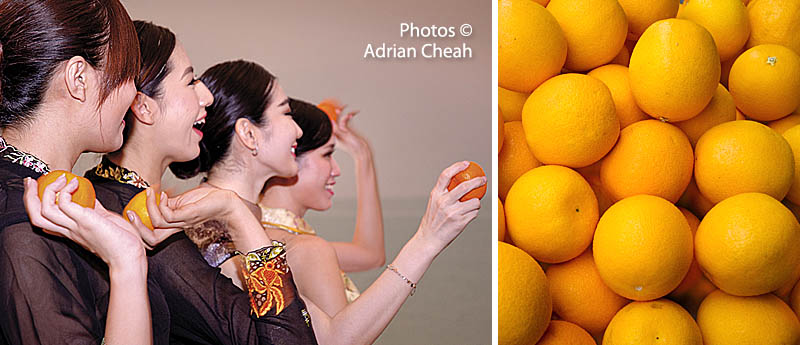
To commemorate this significant day, various activities would take place – the Dondang Sayang musical entourage serenading classic songs and "pantuns" (Malay poems) as well as a tangerine-throwing ceremony, often held at Gurney Drive or the Esplanade.



"Dondang Sayang," which translates to the lullaby of love, is an intricate performance of sung poetry. The theme commonly revolves around the intricacies of love, with a playful exchange between a man and a woman. In this poetic interplay, each participant tries to outwit the other in the pursuit of affection. The performance is accompanied with the sounds of traditional musical instruments.
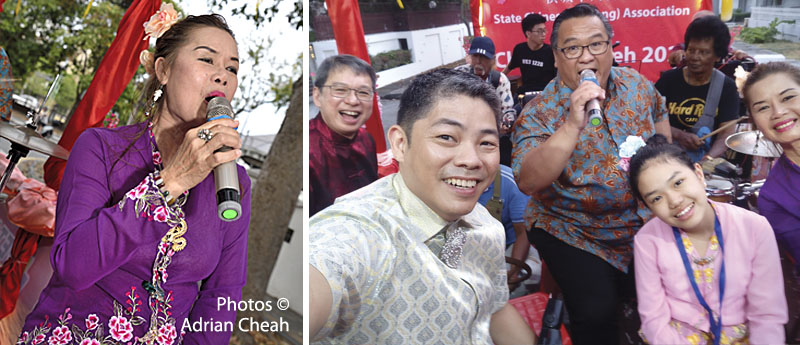



The State Chinese (Penang) Association has annually celebrated Chap Goh Meh with various activities. These include a gala dinner on the eve and, on the day itself, a Dondang Sayang musical float procession and traditional Nyonya dance performances at designated venues. The Penang State government would also join in the merriment with chingay and lion dance performances and at times, with live concerts and street food galore as well.
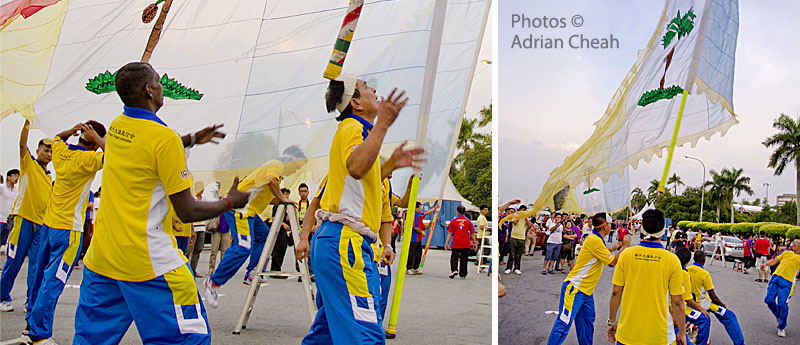

In the bygone era, Chap Goh Meh stood out as one of the rare occasions when eligible young Nyonyas, adorned in their finest attire, were permitted to venture beyond the confines of their homes. A hopeful young maiden (or spinster) would cast tangerines into the sea, expressing her desire to find a suitable husband. From afar, eager bachelors could only admire and ogle the passing beauties, as they were always accompanied by an entourage of the fiercest-looking aunts and amahs! Subsequently, matchmakers would then be dispatched and if successful, a union would follow suit.
To preserve this charming tradition in contemporary times, the tangerine-throwing event has transmogrified into a competition of sorts, where the tangerines thrown into the sea by girls (single or otherwise) would be scooped up by boys in boats. The boat with the most oranges would be declared the winner. The pursuit of love and marriage has entirely dissipated, leaving us only a reflection of the romantic past.
---------------------------------------------------------
Written and photographed by Adrian Cheah
© All rights reserved
Updated: 21 February 2024